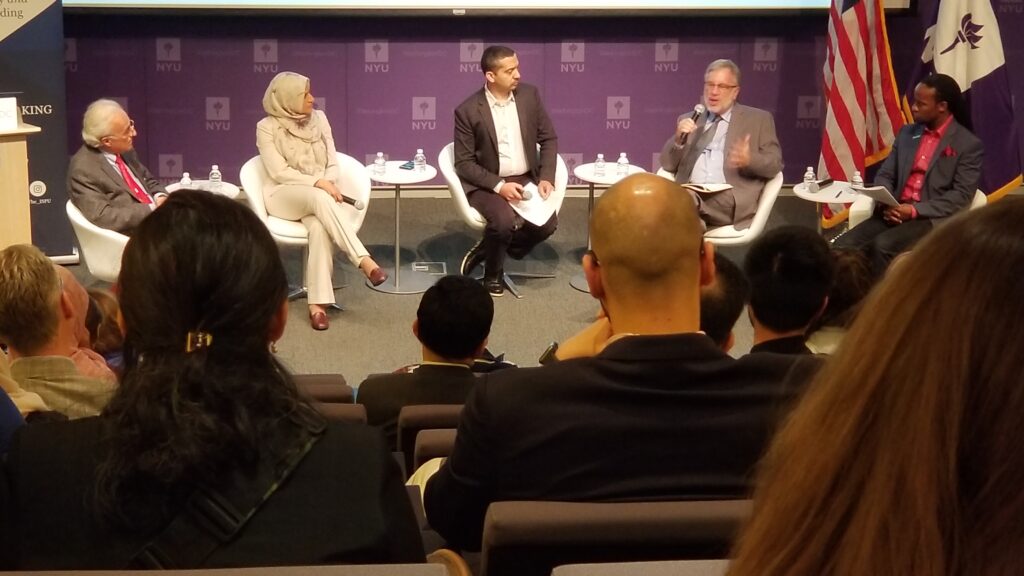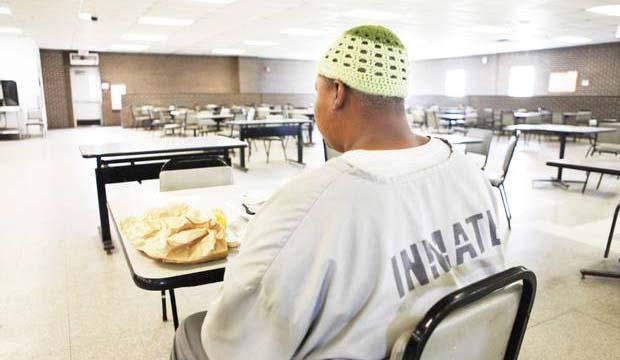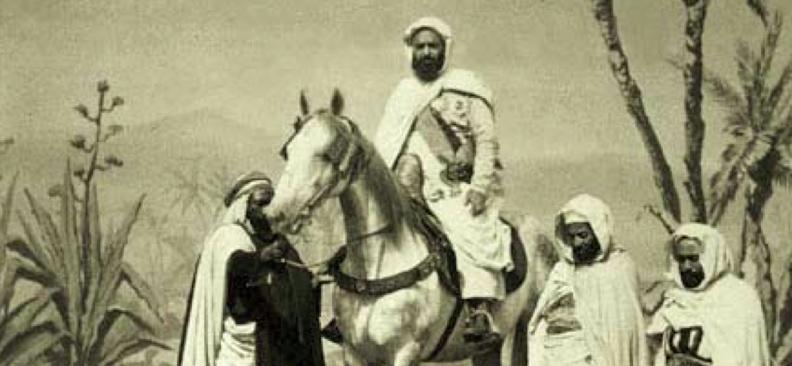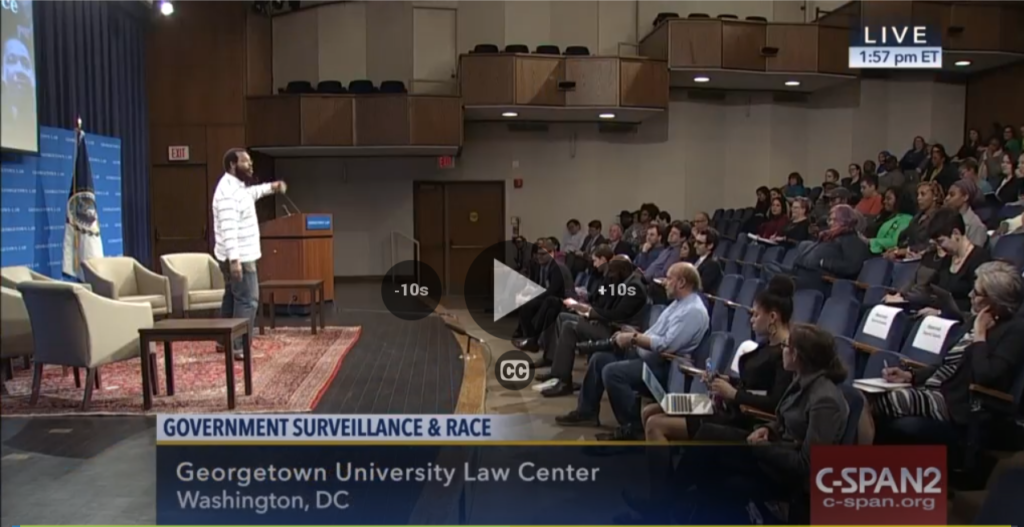
Returning for its fourth year, this month the Institute for Social Policy and Understanding (ISPU) released its American Muslim Poll 2019 (AMP). This poll surveys Muslims, Jews, Catholics, Protestants, white Evangelicals, and those who consider themselves non-affiliated to compare attitudes across religious groups. The poll offers evidence-based contributions to a landscape that saw Muslims increasingly discussed, but not included, in national debates. Since 2002, ISPU has been at the forefront of discovering trends and opportunities that impact the American Muslim community. It has assembled leading experts across multiple disciplines, building a solid reputation as a trusted source for information for about American Muslims.
The ISPU announced its publication “American Muslim Poll 2019: Predicting and Preventing Islamophobia” during an event in the nation’s capital on May 1, 2019. Hosted by NYU Brademas Center Events in Washington DC, ISPU Director of Research Dalia Mogahed presented the findings of the survey followed by a lively discussion with a respected panel of guests. This year’s survey also includes ISPU’s second Islamophobia Index, created in partnership with Georgetown’s Bridge Initiative. The Index measures how much the public endorses anti-Muslim tropes while it examines and teases out factors that predict and prevent Islamophobia.
Opening the discussion, Mehdi Hasan a prominent journalist at Al Jazeera English highlighted the importance of the survey not only for Muslims but for whole range of Christians, Jews, and other minorities at a time where the future for those minorities looks dark and bleak because of what he described as an “era of hate.” Mehdi mentioned that under President Trump’s watch, hate has been mainstreamed, normalized, escalated, legitimized, and amplified. As an example of this trend, Mehdi referred to the newly elected congresswoman Ilhan Omar, a hijab-wearing former refugee who had been demonized and smeared in the most racist, Islamophobic ways, and “her life is in a genuine danger because of that” he said. He also emphasized that hate crimes rose by 37%, the third consecutive year these crimes have increased based on FBI reports while the number of assaults against Muslims is higher now than it was during the 9/11 attacks in 2001. Mehdi finished his presentation by asserting that we all need to stand together against hate and bigotry but we have to do it armed with the best information and the best facts and figures of what’s going on in our communities.
ISPU Director of Research Dalia Mogahed presented the findings of the survey and explained ISPU’s methodology in collecting data from different members of communities from across the country. After that, she turned to present the key findings of the survey where she mentioned that Muslims are the least likely to approve of President but more likely to express optimism with the direction of the country. More importantly, Muslim voters registration is still lower than any faith groups the survey has measured and that income, age, mosque attendance, and local political engagement are the strongest predictors of voter participation among Muslims. She also emphasized that there are factors that can help eliminate or lower Islamophobia such as knowing a Muslim, knowing the Islamic faith and positive views of other minority groups, these factors are all linked in lowering islamophobia. At the end of her presentation, Dalia concluded that partisanship is another powerful factor in lowering islamophobia, however, she asserted that knowing the Islamic faith is a stronger predictor of lowering islamophobia than knowing a Muslim.
Dalia’s presentation was followed by a discussion of a distinguished panel of experts from different communities and faiths and moderated by Mehdi Hasan. The panel consisted of four panelists, John Esposito, Professor of Religion & International Affairs and Islamic Studies at Georgetown University; Walter Ruby, Chairman of the Greater Washington Muslim-Jewish Forum; Dalia Mogahed, ISPU Director of Research; and Ibram Kendi, Professor and Director of the Antiracist Research & Policy Center at American University. Panelists shared their views about the phenomenon of Islamophobia and the challenges that those minorities are facing inside their communities and the United States in general.
Walter Ruby, Chairman of the Greater Washington Muslim-Jewish Forum, said about the California synagogue attack that for the first time he does not feel safe in America. However, this feeling extends to other minorities that no one is safe, thus, we need an alliance between all these communities in order to face these attacks in the future, he said.
Answering another question about how ignorant Americans are about the basics of Islam and what can be done to fix the problem, John Esposito argued that in terms of getting people to understand Islam better, it is not enough to develop a program to train teachers but we need a program that trains the trainers.
Answering a question posed by this reporter about how we can put the white supremacist phenomenon at the center of the 2020 election campaign, Dalia Mogahed emphasized that we have to work with other impacted communities like Black Americans and Jewish Americans who are affected by the same threat of white supremacists which was emboldened and legitimized by the current administration.
After an hour and a half of interactive dialogue and discussion, the experts concluded that whether it is Islamophobia, anti-Semitism, or racism against black Americans the problem has reached record levels with the current administration nurturing those narratives. However, in order to face those common threats working together as minorities is the only way to raise awareness and pressure this administration to change its stance and policy toward these minorities.
On February 2, 2019, The Muslim Law Student Association at the UDC David A. Clarke School of Law hosted a symposium entitled “Our Forgotten Community: Prisoner’s Rights & Religious Freedom”.
Our Forgotten Community: Prisoner’s Rights & Religious Freedom

The conference shed light on Muslims behind bars and how their rights are frequently violated, especially during Ramadan. The First Amendment of the United States Constitution protects a prisoner’s right to practice their religion of choice without interference, however, there is no doubt that jails and prisons throughout the country frequently violate the religious rights of inmates who peacefully seek to worship.
The event brought together lawyers, scholars, and activists – some who spent time in prison such as Yusef Salaam from the infamous Central Park Five jogger case – and others who have dedicated their careers advocating for prisoner rights like Professor Eric Balaban of Georgetown Law. Speakers shared their stories and provided evidence of how some correctional facilities throughout the country are systematically breaching the rights of their Muslim Inmates.
Covering many topics such as incarceration and religious freedom, Guantanamo Bay, and Blacks as domestic terrorists, the speakers explored different options of how to help this forgotten population. More importantly, they raised awareness to educate the public about ongoing violations such as denying adequate meals during Ramadan for Muslim prisoners. Last year the Council on American-Islamic Relations (CAIR) filed at least three lawsuits in three different states on behalf of Muslim plaintiffs against three prisons because they “starved” and fed them pork products during Ramadan.
The event began with opening remarks by John C. Brittain, Acting Dean of the University of the District of Columbia’s David A. Clarke School of Law. The first panel was moderated by UDC Associate Professor of Law Saleema Snow. She was joined on the panel by Lena Masri, Jonathan Smith, Professor Khaled Beydoun, and Professor Ajmel Quereshi.
Opening the discussion CAIR National Litigation Director Lena Masri emphasized that as Muslims, we have an obligation to protect those prisoners because they are vulnerable and completely dependent on the government. Masri has litigated numerous cases involving constitutional rights and religious accommodations on behalf of American Muslims in jails and prisons nationwide. She mentioned a number of cases where she had to intervene in order for prisoners to get their religious materials and realized that many facilities are trying to deny religious materials as a part of a systematic approach to prevent Muslims from practicing their faith.
She even mentioned an example of this pattern when she was contacted by an inmate at the Riverside Regional Jail. After trying to understand the problem she discovered that the facility was literally preventing inmates from converting to Islam by creating segregated living quarters — what inmates refer to as the “God Pod” — for those inmates who agree to study and live their lives in accordance with the Bible while it does not allow any other religious practices in the facility.
Masri also mentioned another case of a prison in Arkansas where the facility was forcing Muslims to have Friday prayer combined with other faith groups. One of the Muslim inmates refused to pray in this manner, so he was taken off of the Muslim list and no longer allowed to take part in any religious activity including Ramadan; he didn’t have a single meal during the entire month of Ramadan.
Dr. Khaled Beydoun, a law professor at the University of Detroit Mercy School of Law, said many of these violations are rooted in the fear of prisoner radicalization. He added that most of the rights that Muslims are enjoying today go back to the ’60s when the Nation of Islam, an African-American political and religious movement conceived in Detroit in 1930, pushed for religious liberties. Just as the Nation of Islam prisoners were denied their rights in the 1960s because they embodied a the threat of blackness combined with the threat of being Muslim, Muslim inmates today in the post-9/11 era are also denied their religious rights out of a fear based on ignorance.
Dr. Yusef Salaam was a member of the Central Park Five, a group of teenagers wrongfully imprisoned after the brutal sexual assault of a jogger in Central Park in 1989. The victim, a 28-year-old investment banker named Trisha Meili, was beaten with a rock, tied up, raped and left for dead. She was discovered hours later. Yusef talked about his experience when he was arrested with four other teenagers. “The police deprived us of food, drink and sleep for more than 24 hours … under coercion, we falsely confessed. Though we were innocent, we spent our formative years in prison, branded as rapists,” he said. Salaam also recalled how Donald Trump used his money to take out full-page ads in all of the city’s major newspapers, urging the reinstatement of the death penalty in New York. Yusef said that he was terrified that he might be executed for a crime he didn’t commit.
After one day of interactive dialogue and discussion, experts emphasized that it is a duty to defend the rights of Muslim prisoners to practice their faith freely including having access to halal food, growing beards, and attending Friday prayer. They also asserted that Muslim prisoners are truly the most forgotten community because of their vulnerability as Mesri affirmed when she was asked why she defends “those criminals?” She said we “owe a responsibility to those who are most vulnerable and there is no population more vulnerable than those Muslim prisoners.”
Rediscovering Emir Abd el-Kader: A Story of True Jihad

On September 12, 2018, Wesley Theological Seminary in Washington DC hosted a conference entitled “Rediscovering Emir Abd el-Kader: A Teacher for the World”. The conference traced the history of Emir Abd el-Kader or Abdelkader El Djezairi, who was an Algerian religious and military leader who led a struggle against the French colonial invasion in the mid-19th century (1830-1847). The conference highlighted his consistent regard for what would now be called human rights, especially towards his Christian opponents, and drew widespread admiration. His crucial intervention to save the Christian community of Damascus from a massacre in 1860 brought him honors and awards from around the world.
The event brought together scholars, experts, and attendees from the Algerian embassy in Washington to review the life of Abdelkader El Djezairi as Commander of the Faithful who was one of the least known but most influential Muslim leaders of the 19th century due to his efforts to unite the country against foreign invaders. The conference examined different ways that impacted his education, spiritual and religious life and looked at the importance of the cultural and religious manifestations of Islam in educating the new generation about the true values of Islam. The conference also explored the role of Jihad in Abd el-Kader’s life and the role of knowledge in shaping his deep spiritual convictions and Islamic beliefs as a foundation of his character.
Covering fourteen topics such as “Abd el-Kader and Salafism”, “Abd el-Kader as Role Model at home and Abroad”, and “Mobilizing the unknown Abd el-Kaders”, the speakers discussed Abd el-Kader’s mission to mitigate fear and ignorance of Islam among Muslims and non-Muslims. This mission required exposing people to Islam’s rich history through people and traditions within Islam that once made it a great culture of openness, learning, and relative tolerance.
The conference began with opening remarks by representatives of The Abdelkader Education Project (AEP) which organized the event. Opening the discussion, Kathy Garms, Executive Director of Abdelkader Education Project, highlighted the importance of The Abdelkader Education Project, and its campaign to revive the memory of this Bedouin scholar, warrior, and a humanitarian hero who emerged from struggles with France.
Out of the eight topics that were discussed during the conference, John Kiser, author, and co-founder of, Abdelkader Education Project answered the crucial question concerning why Abdelkader matters today. Kiser talked about his book “Commander of the Faithful: The Life and Times of Emir Abd el-Kader” and the necessity of finding a platform for understanding and appreciating the rich diversity of God’s creation while gathering people of all faiths and cultures to find a common ground through this hero and his journey.
Daisy Khan, Executive Director of WISE in her presentation “Abdelkader as Role Model at Home and Abroad” addressed at least three elements of Abdelkader’s character that make him such a worthy heroic role model in today’s diverse and interconnected world: He was also “local” and “universal” at the same time, she said. He was deeply and authentically Muslim. Daisy traced the origin of the story of Abdelkader’s statue in the headquarters of the International Committee of the Red Cross in Geneva, Switzerland when she confirmed that Henry Dunant, the Swiss Calvinist and humanitarian activist who founded the Red Cross, learned of Emir Abdelkader’s chivalrous conduct on and off the battlefield during his visit to Algeria. Dunant counted him as one of the inspirational sources of the Geneva Code of Conduct. The Emir, he learned, initiated the first prisoner exchanges with the French, and forbade the decapitation of French soldiers who were wounded or surrendered on the battlefield. He also insisted on respectful treatment of French prisoners, had their wounds treated, and gave them the same rations as those given to his own men.
Daisy finished her presentation by emphasizing that Emir Abd el-Kader even enforced other rules of Islamic warfare: no mutilation of the dead, no shooting in the face, no destroying nature, and no killing of women, children, old men, or animals (except to eat). Destroying sacred sites and shooting priests and monks was also forbidden.
After a full day of interactive dialogue and discussion, the experts agreed on the importance of cultivating Abd el-Kader’s model and his qualities in the new generation of youth and leaders while rejecting wrong interpretations or extremist views of Islam. Emir Abd el-Kader, whom Algerians sometimes call their George Washington, was a heroic man whom people of all cultures and religious faiths can look to for inspiration and to discover the right path of Islam based on knowledge and mutual respect in dealing with one another.
The Color of Surveillance: Government Monitoring of American Religious Minorities

On July 19, 2018, Georgetown University Law Center hosted a conference entitled “The Color of Surveillance: Government Monitoring of American Religious Minorities”. The conference traced the history of modern surveillance and asked if it was consistent with the intentions of the American founders. Do modern counterterrorism initiatives appropriately protect civil rights and civil liberties? How are local communities, advocates, and artists responding to these challenges? The conference also explored the role of law enforcement and national security surveillance and the relationship between Muslim communities and the government post-9/11.
Now in its third year, “The Color of Surveillance,” organized by the Center on Privacy & Technology at Georgetown Law, brought together a wide range of speakers, including activists, lawyers, policy advocates, and technologists. Discussions focused on government monitoring and its deep impact on American religious minorities throughout American history. The conference covered different topics from federal interrogations of early Mormons in the Utah territory in the 19th century, to the 20th-century surveillance of Jewish, Muslim, and Sikh communities, to modern post-9/11 surveillance systems.
Opening the discussion, Mr. Alvaro Bedoya, the founder and director of the Center on Privacy & Technology began his discussion by mentioning Trump’s call for a Muslim ban and highlighted that the call was about surveillance. When Trump said, “we need time to investigate until we figure out what’s going on.” Bedoya said Trump was talking about surveillance. “Today, we are not looking at the law behind the Muslim ban or its claimed constitutionality instead we’ll look at the old and ugly idea behind it that religious minorities are different and dangerous and they need to be investigated and watched,” Bedoya said. He also asked many crucial questions such as: how does it feel to be watched? How does it feel to serve your country in uniform only to learn that your country is spying on your mosque because of your religion? How does it feel to volunteer at a charity when you know that the organization is infiltrated by a government informant? These are the questions that speakers and activists tried to answer in different panels and presentations at the conference.
Mrs. Brooke Allen, a Professor at Bennington College, made a presentation addressing the idea that the United States is a Christian nation founded on Christian laws. Allen added that the United States was among the first countries in the world to establish a non-religious state where the First Amendment to the United States Constitution prevents Congress from making any law establishing religion or prohibiting the free exercise of religion. Allen finished her presentation by emphasizing that the federal government of the United States is not founded in any sense of Christian religion, rather it is a secular state.
Filmmaker Assia Boundaoui and her mother Rabia Boundaoui talked about their experience as part of a Muslim community in the Chicago suburbs when they realized they were being watched and listened to by the FBI in 1999. After making a film Assia began asking her neighbors and community to share their experience. The film begins with anecdotal evidence of surveillance and it ends with a lawsuit against the DOJ and the FBI for the records of the surveillance where she uncovered tens of thousands of pages. She eventually won the case against the FBI. Assia remembered the first moment when she woke up at 3:00 a.m. and saw a light outside. “I must have been 16,” she said. “I got up and looked outside and there were two men on the telephone pole doing something on the wires.” Assia also talked about the day when three FBI agents with black suits came to her house asking her mother Rabia questions about her neighbors asserting that the same thing happened to everyone in the community.
Asked about her experience and if she ever thought of giving up since law enforcement usually justifies their surveillance as necessary, Assia replied that “it took a generational difference for this mentality to change, maybe my mother has an immigrant mentality, and a lot of immigrants in my neighborhood thought that if the FBI came to their house, they [shouldn’t] make any noise. The next generation feels entitled to their Americanness and they know they have rights and that [surveillance] should not have been happening,” she said. Submitting is not the answer, she added. Mass surveillance and specifically profiling ethnic-racial groups is not an effective way of law enforcement and it does not help in solving crimes, explained Assia. Besides, Assia said, in 20 years of surveillance of the community, the FBI never found a single act of terrorism or convicted anyone of terrorist activities.
The conference also hosted another activist who was directly affected by surveillance. Asad Dandia, one of the plaintiffs, led a lawsuit against the NYPD regarding its Muslim surveillance program.
In 2012 when Dandia was 19 years old he decided to raise money and deliver it to poor families. He met with some friends every Friday after the Friday prayer in the mosque in Brooklyn. Dozens of volunteers joined him to help achieve this task. One day, Asad said “a young man contacted me by Facebook, where he wanted to get involved. I introduced him to my friends but he started asking for their phone numbers and if he can come over to their homes.” Later on, a friend came to him and asked to be removed from the fundraising group because he was being watched. His friend said “they have photos of all of you”. Eventually, the young man who contacted Dandia on Facebook confessed that he was an informant for the New York Police Department. “That is when things really blew up,” Asad said.
In June 2013, Dandia filed a lawsuit against NYPD and last year he won the case when he reached a settlement in the lawsuit. In the end, Asad said, “I think that the settlement is a step towards a broader process of seeking justice.”
One of the organizations dedicated to ensuring that US national security policies and practices are consistent with the Constitution, human rights, and civil liberties is the ACLU National Security Project. Hina Shamsi the director of the ACLU talked about watch lists or blacklists where several cases and clients were suspected terrorists based on vague and overboard criteria without a meaningful process to defend themselves and clear their names.
In the post-9/11 era, the government has created different kinds of lists. The most famous one is the terrorist screening database which includes 1.2 million records and is managed by the FBI’s terrorism screening Center. Through this list, information flows to other subsidiary lists including the no-fly list, where people are banned from flying to work from and over U.S. airspace. But the problem with the no-fly list, Hina said, is that “you would show up at the airport, you would be told publicly in front of other people often by the airline personnel, you cannot fly, there is a security list you are on as a suspected terrorist.” Ironically, the U.S. government’s policy was not to confirm or deny whether you were on the no-fly list. Another watch list that targeted primarily Muslims and resulted in the denial or delay of immigration benefits to people seeking visa or naturalization, Hina confirmed. This list is used to identify people to whom they are going to deny visas or passports.
As a result, Hina asserted that “Information from these lists goes to multiple government agencies and is shared based on the official acknowledgment of this with [more than] 22 foreign governments,” and “depending on the list, [you will be denied] to travel by air or sea, invasive screening, denial of visas, detention and questioning by the U.S. and foreign governments”.

في الغرب يوجد مساجد في كل حي تقريبا، ويمارسون الدعوة علانية، ويصلون في الشوارع وتوفر لهم السلطة الأمن والحماية، وحقوقهم كاملة، ويجمعون الأموال ويقيمون الحفلات، ويمنحونهم إجازات خاصة في اعيادهم، ويترشحون للإنتخابات، ويحق لهم التراجع عن ديانتهم أو البقاء عليها….. هل يتمتع الغربي بنفس الحقوق، هل بإمكانهم إقامة شعائرهم في الشوارع وتوفر له الحماية، هل يسمح لهم بالترش ????